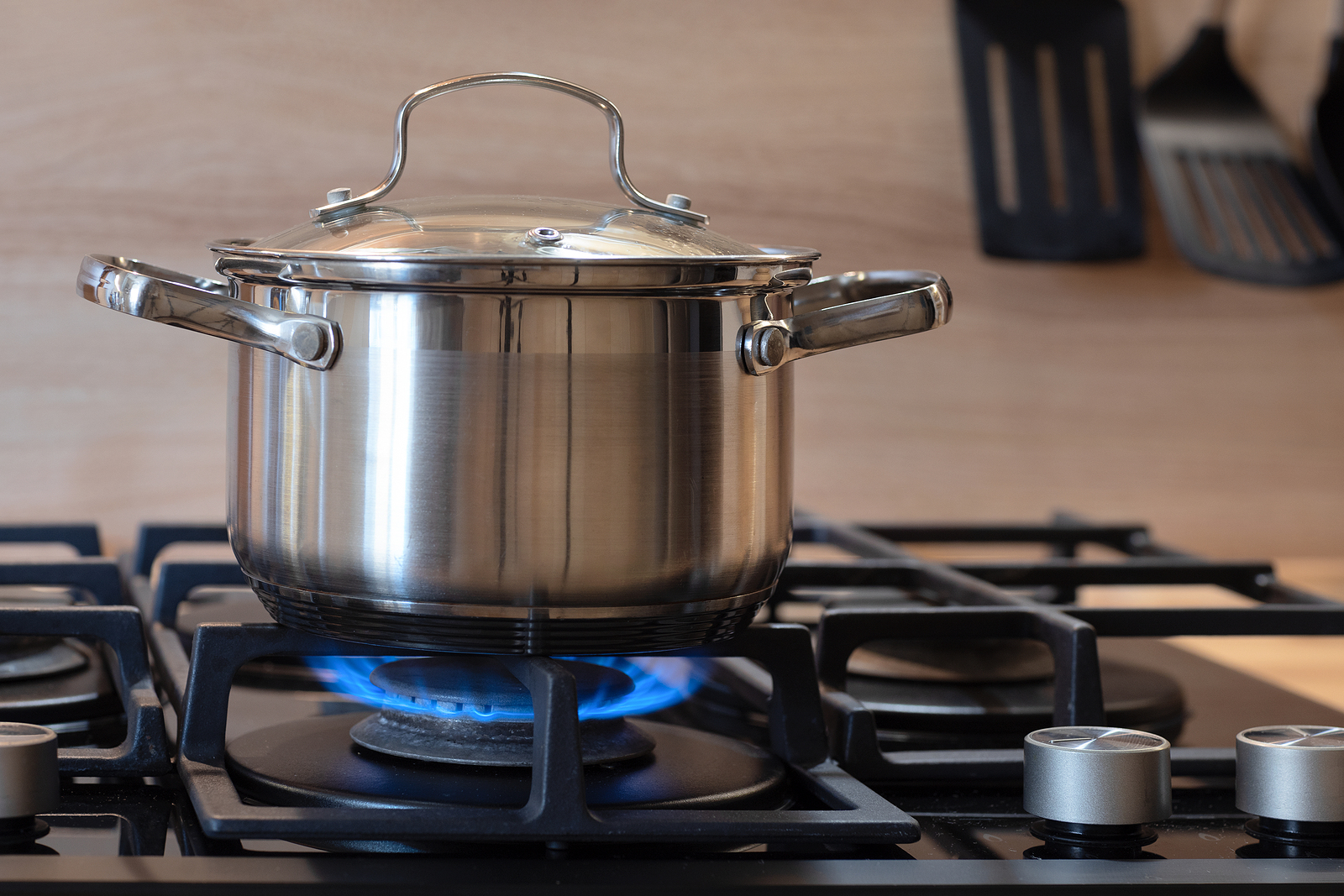When a homeowner needs a new range (or stove, whichever you choose to call it), he or she typically buys a replacement that fits the fuel source of the old appliance. In other words, they’ll replace a gas stove with another gas stove or an electric one with an electric stove. Well, I like to be different, so we replaced our electric stove with an Induction cooktop and a Steam Oven.
If you’ll be starting a kitchen from scratch or if you don’t mind the expense of swapping out gas for electric (or vice versa), you’ll need to make a decision. I’m going to stop talking about an electric range here. I think if you love to cook, these are the 2 options!
What’s the difference between gas vs induction cooktops? The main difference between the two is the way they generate heat to cook food. Gas cooktops heat cookware using an open flame, while induction cooktops generate heat using electromagnetism, and turn your cookware into its own source of heat.
As usual, we’re here to help.
I love to cook. I used a gas cooktop for about 15 years in Toronto. I loved cooking on our Jenn-Air gas cooktop. I didn’t really know any other option other than the older electric ovens/stove. Gas was the way to go as far as I was concerned. And most professional chefs agree.
When it was time to renovate our place in Kits, gas wasn’t really an option. I spoke with a plumber to see if it was feasible. It was, yippee. He had to run a gas line through from the living room into the kitchen. That didn’t seem too practical. On to plan B. I still wanted an option that was as good as gas.
Although I wasn’t familiar with Induction cooktops, I had heard good things about them. I didn’t really understand how they worked. I learned more courtesy of our local friends at Midland Appliances.
Induction uses electromagnetism to transfer energy directly from the induction element to the cookware, interesting! With an induction cooktop, the pans/pots become the heat source, without one on the stove, there’s nowhere for the energy to go and nothing will happen.
You do need to buy induction-compatible cookware. You might have to donate some of your old pots and pans if you go this route. What’s cool about induction is the cooktop itself never gets hot, very cool 😉
This makes induction cooking an incredibly energy efficient option, I definitely like that. Let’s conserve as much energy as we can. I got out the timer to see how long it takes to boil water with Induction, 1 minute and 40 seconds later the kettle was whistling!
The other options, gas, electric coil, or glass cooktop, take much longer to heat. Because so much heat dissipates into the air and onto the stovetop during thermal energy transfer, gas, and electric cooktops take longer to heat a pan and waste more energy in the process.
Interesting side note. Did you know that 90% of BC’s gas production comes from fracking? Making it the 3rd largest source of our climate pollution, not cool! I won’t go into detail about what fracking entails. The process uses a lot of fresh water mixed with carcinogenic chemicals to force the gas to the surface. Chemicals that can leech into our fresh water supply. Plus we are using water for the extraction process, which doesn’t make much sense. If you get a chance, watch the movie Gasland.
Let’s compare the two:

Gas ranges and induction cooktops are both popular choices for home cooks, but they have some key differences that make them better suited for certain types of cooking.
Gas ranges use gas as the heat source and have a flame that directly heats the pot or pan. This makes them a good choice for high-heat cooking, such as searing or sautéing, as the flame can be adjusted quickly and easily to get the desired temperature. They also work well for simmering and low-heat cooking, as the flame can be turned down to a low simmer.
Induction cooktops use electricity to create a magnetic field that induces heat in the pot or pan. This means that the cooktop itself doesn’t get hot, only the pot or pan. This makes induction cooktops safer to use than gas ranges, as there is no flame or hot surface to burn yourself on. Induction cooktops are also more energy efficient than gas ranges, as the heat is transferred directly to the pot or pan, rather than being lost in the air.
Another advantage of induction cooktops is that they can be more precise in controlling the heat. With gas ranges, the flame can be adjusted but the temperature can fluctuate due to the size of the pot or pan or the wind. Induction cooktops can be set to a specific temperature, which makes them ideal for cooking with recipes that require precise temperatures.
However, Induction cooktops have a few disadvantages as well. Firstly, they require induction-compatible cookware, which means that you can’t use aluminum or copper pots and pans. (If a magnet sticks, you are good to go) Secondly, they are more expensive than gas ranges.
How about the environmental impact of both?
Environmental Impact?

Both gas cooktops and induction cooktops have different environmental impacts that should be considered when making a choice.
Gas cooktops, which use natural gas or propane as a fuel source, can have a significant impact on the environment. The extraction, transportation, and use of natural gas can lead to air and water pollution, as well as greenhouse gas emissions. Additionally, if the cooktop is not properly maintained, it can leak small amounts of carbon monoxide and other toxic gases into the air.
On the other hand, induction cooktops use electricity as their power source, which can come from renewable sources like solar and wind power, or from fossil fuels like coal and natural gas. In areas where the electricity is generated primarily from renewable sources, induction cooktops can have a lower environmental impact than gas cooktops. However, if the electricity is generated primarily from fossil fuels, the environmental impact of an induction cooktop will likely be greater than that of a gas cooktop.
Another factor to consider is the energy efficiency of the cooktops. Induction cooktops are generally more energy-efficient than gas cooktops, which means they use less energy and therefore create fewer emissions. This can help to reduce the environmental impact of cooking. They tend to be slightly more expensive than Gas, but the energy savings should help balance that out over time.
In summary, gas cooktops can have a greater environmental impact due to the extraction and transportation of natural gas, and the potential for leaks of toxic gases. However, the environmental impact of an induction cooktop will depend on the source of the electricity used to power it. In general, induction cooktops are more energy efficient, and therefore create fewer emissions. If you’re looking to reduce your environmental impact, it’s important to research the source of electricity in BC and choose a cooktop that aligns with your values.
Health Impacts of Gas Cooktops

Yes, you are reading that correctly. What are the health impacts of using a Gas cooktop in your home? I certainly wasn’t aware of this when I was using mine. Here we go!!
- Burning natural gas releases high levels of nitrogen oxides, linked to asthma in children
- Children living in a home using a gas cooktop have a 43% higher risk of asthma
- The nitrogen oxide pollutants linger for a few hours after
- Gas stoves leak high levels of methane, even when turned off
- They also release formaldehyde, nitric oxide and carbon monixide
You can read more about what Canadian scientists found out here.
Ultimately, the choice between a gas range and an induction cooktop will depend on your cooking needs, budget and personal preferences. Personally, I’m glad I have my induction cooktop after that comparison. I hope that helped you with your decision. Happy cooking Kits 👩🏼🍳
About the Author:

Induction cooktops vs Gas, which one is better Kits? was provided by Regan Pyke, a Vancouver Realtor and a leader in the field of sales, marketing, and real estate investing. Regan can be reached via email at [email protected] or by phone at 778-228-2448.
Thinking of buying or selling your Vancouver West, Kitsilano home, or Condo? I have a real passion for buying and selling Real Estate, as well as marketing & real estate.



 EN
EN
 FR
FR